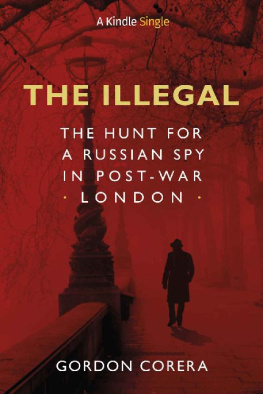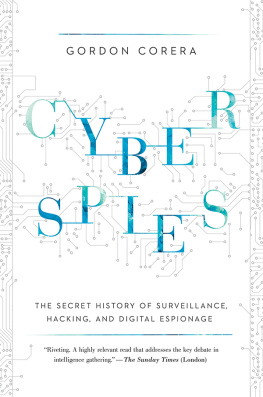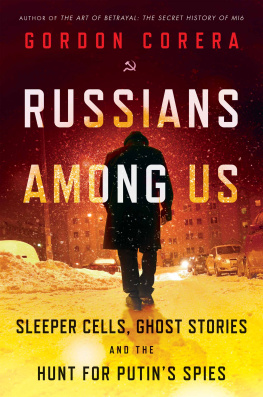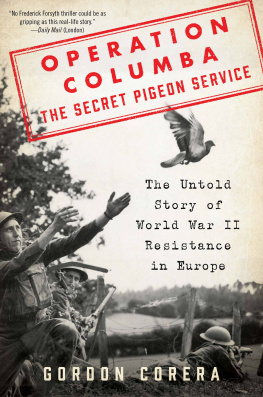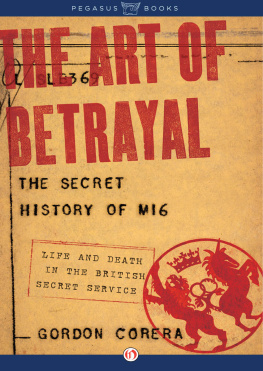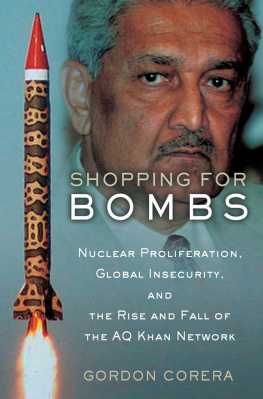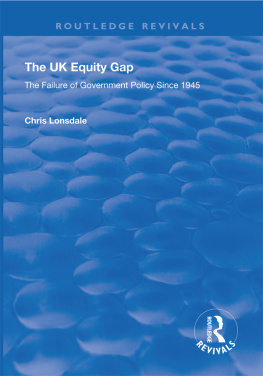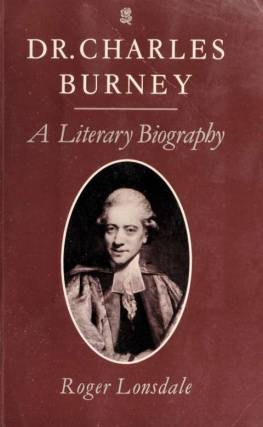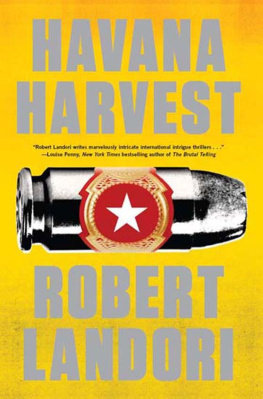

Text copyright 2018 by Gordon Corera
All rights reserved.
No part of this work may be reproduced, or stored in a retrieval system, or transmitted in any form or by any means, electronic, mechanical, photocopying, recording, or otherwise, without express written permission of the publisher.
Published by Amazon Publishing, Seattle
www.apub.com
Amazon, the Amazon logo, and Amazon Publishing are trademarks of Amazon.com, Inc., or its affiliates.
eISBN: 9781503957466
Cover design by RBDA Studio
CONTENTS
ARRIVAL
Gordon Lonsdale did not arrive by swimming from a submarine off the shore of Scotland, wearing a frogmans suit with a waterproof container strapped to his back. That was what some excitable reports would later claim. His entry was much more mundane. That was the point.
The passengers filed off the SS America as it arrived in Southampton from New York in March 1955. Foreigners had to fill out forms and have their passports and visas scrutinised. But as a Canadian part of the Empire Gordon Lonsdale joined the British line where checks were cursory.
A special train then ferried passengers to Londons Waterloo station. It was late and dark, drizzling with rain, when Lonsdale checked into a damp, cold Victorian hotel nearby. Dropping a coin into a meter was the only way to generate any heat.
The next morning, he headed to the more salubrious surroundings of the Royal Over-Seas League. The League was a stones throw from the Ritz Hotel in St Jamess and close to the other prestigious clubs in town. The receptionist, Elizabeth, saw a man walk in who was in his thirties, not too tall but with strong cheekbones. His distinctive eyes and dark, wavy hair coupled with an easy manner made her take notice. Lonsdale did the same, noting that she might be a useful subject for his charm. He presented his membership card and explained that he was going to study Chinese at the School for Oriental and African Studies, part of the University of London. She said he was welcome to stay in one of the Leagues rooms while he looked for housing. Soon after he went to his room, the phone rang. The Director of the League wanted to meet in half an hour. In the bar the Director made a point of offering a Canadian whisky to his guest and then drew Lonsdales attention to the view from the window. Buckingham Palace lay just across Green Park and the Director explained that the flying of the Queens Standard meant she was in residence. They should drink to her health. Lonsdale nodded. The Queens health, the men around the bar said formally. Lonsdale had settled in rather nicely, he could reflect that night, as he began plotting how he could subvert the Queens subjects to betray their country.
Gordon Lonsdale was a spy not just any spy, but a member of an elite breed apart. He was an illegal. His story has been shrouded in lies. Using declassified documents and sources in Russia and the West, the deceptions can now be stripped away to reveal a story which tells us much about how Russia spies and the challenges of living a double life.
For the first few weeks, Gordon Lonsdale got to know the city. The League was an ideal base. He could invite friends back to the bar. At one point, his League friends even got him into the Houses of Parliament where he watched the substantial figure of Winston Churchill take his seat. The League also helped him find a more permanent home. He explained to Elizabeth, to whom he was now conveniently close, that he needed a reference. She asked the Director, whose word was enough to get Lonsdale into a swanky Art Deco development called The White House, a luxury block of flats on Albany Street, right by Regents Park. It boasted its own swimming pool, restaurant and cocktail bar.
A few days after arriving in London, Lonsdale turned off the Strand to reach the back of the Savoy Hotel. At the rear entrance, facing the Thames, was a phone box. He had walked there every day. This time, when he felt beneath the shelf which held the telephone directories, he found a map pin. That was the signal to clear his dead-letter box a pre-agreed site where information had been left for him. In a small hole in a wall by a flight of steps was a package the size of a wedding ring case. He pushed it quickly into his raincoat pocket. Thirty minutes later he was back in the League. He locked the door and unwrapped the bundle. Inside was a message. It was time to start work.
A few days later Lonsdale stood in front of Da Vincis John the Baptist in the Louvre in Paris. At noon he scratched his left ear with a bandaged finger and then walked out towards the Champs-lyses. A few minutes later a black Mercedes pulled up. He got in and the car headed out to the suburbs. Jean was tall, thin and in his fifties and gave Lonsdale his instructions. He also handed over some letters from Lonsdales wife Galina. Lonsdale read them slowly but then struggled when given the chance to respond to find any words that went beyond vague generalities. That night he flew back to London.
It was gloomy on the first Wednesday in October as Lonsdale sat in a stuffy room and watched his classmates file in for the start of their Chinese course. The choice of course was not an accident. The class was not comprised of the normal twenty-year-old students. Most were nearly a decade older. About half were foreign or had a business background. Lonsdale was in that category. But the other half wore the uniform of pinstripe suits and bowler hats that marked them out as part of the British establishment civil servants. And among them, Lonsdale knew, were some spies. This was where they were sent to learn the language ready for a foreign posting.
Studying Chinese was easy for Lonsdale. That was because he already spoke the language (he had even helped write a textbook in Moscow). The hardest part was hiding that fact. But it gave him plenty of time to work out who was who on his course. In a break between lectures, he found himself next to a tall, relaxed man wearing a tweed jacket and light-grey trousers. He was another Canadian Tom Pope from Ottawa. As often happens, the foreigners and Brits kept themselves separate. But slowly the ice broke. Tom Pope, it turned out, threw a mean, martini-fuelled party and all the students came along with friends and other hangers-on to his place in Bayswater. Lonsdale was always at the centre of things a good storyteller who would wave his hands as he talked. He knew all about theatre and culture but could also drop in the odd reference to having been a lumberjack in Canada. He was an avid amateur photographer and brought along his camera with a flash and took some snaps at one party and asked others to do the same. He promised he would send them round. At one party, another student, an American slightly worse for wear, turned to Lonsdale. Hey, Gordon, I want to share with you a discovery, he said furtively. Except for you and me, they are all spies here.
ILLEGALS
Most spies work under diplomatic cover in a foreign country posing as something like a second secretary for trade. Everyone knows this happens and so embassies are closely watched. MI5 in Britain for instance carefully assessed each Soviet diplomat posted to London to try and work out if they were an undercover intelligence officer and their movements were restricted and monitored. If such a spy is caught in the act, they have diplomatic immunity and can be declared persona non grata and expelled. There is no risk of prison. Other spies work under non-official cover. Lots of countries do this a spy posing as a businessman to meet an agent for instance. This makes it harder to find them but also means they have no protection if captured. An American businessman meeting a Russian diplomat in Moscow might still arouse suspicion and investigation though. So Russia takes this a step further. A true Russian illegal is not just living under cover of a different occupation but takes on an entirely different nationality. The Russian will not to all appearances be Russian but instead German or Canadian. This makes them immeasurably harder to find.
Next page
